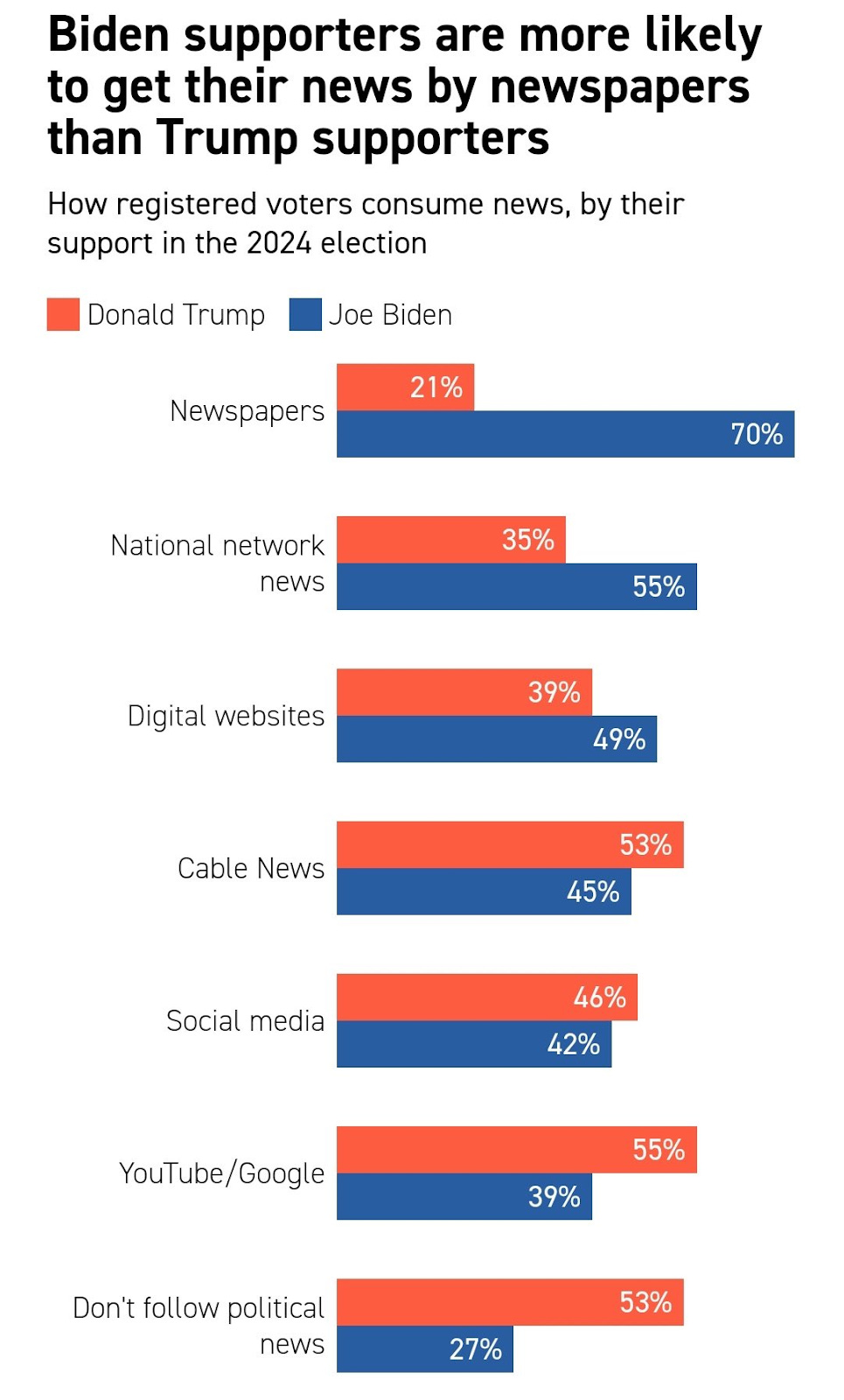I voted for a Democrat for the first time this election, and I don’t regret it for a second. I believe Trump poses an acute and immediate threat to democracy. But as someone who’s spent a lot of time in MAGA circles, I want to offer a factor that I believe contributed to his win: toxic femininity — not from Harris but from the left as a whole. My message for Democrats is simple: Stop being so marmish. I understand our democracy is at stake and that some issues feel deeply personal, and this is precisely why I am writing this — to mitigate further backlash. For God’s sake, stop being so self-righteous and pick your battles more carefully. When everything is a catastrophe, nothing is.
Since moving across the political spectrum, I’ve noticed how emotional space is unevenly divided in our society, especially along gender and ideological lines. If you follow my writing, you know I’ve written extensively about masculinity dysfunctions on the right. But today, I am focusing on the left's toxic femininity and how it warps public discourse, alienating men in particular.
I come at this from the perspective of an ex-Trumper who’s upset that Democrats lost to someone as flawed as Trump. Still, I can’t deny some petty satisfaction in seeing self-righteous Democrats humbled. I’m conflicted. I wanted Harris to win, primarily for the country but also to align with my personal evolution. But that didn’t happen, and now I’m grappling with how to engage.
When I say “toxic femininity,” I mean behaviors and cultural norms traditionally associated with femininity that, when taken to extremes, can become harmful or stifling, particularly in public discourse. Toxic femininity can include emotional manipulation, moral superiority, weaponized victimhood, and an excessive focus on emotional safety.
In many ways, this approach has become the business model of the Democratic machine. Take, for instance, their focus on abortion rights as the cornerstone of Harris’s campaign. Democrats poured more money into abortion messaging than any other issue, using aggressive moral appeals like sex boycotts, memes, and even Handmaid’s Tale imagery to galvanize support. Yet, despite these efforts, female support for the Democrat candidate fell from 55% in 2022 to 53% in 2024.
I realize this is a touchy subject. But if the term “toxic femininity” makes some people clutch their pearls, I’d ask if they feel the same about “toxic masculinity.” Isn’t this double standard part of the problem?
In his essay “Women’s Tears Win in the Marketplace of Ideas,”
argued that women’s influence in emotional expression has shaped public discourse in ways that contribute to cancel culture and power imbalances. For instance, women can express intense emotions publicly without backlash, while men face social penalties for doing the same. Men avoid confronting women’s emotions, creating a culture where female-led sensitivities often set the boundaries of acceptable speech. “Imagine at least one crying woman in every boardroom, newsroom, faculty meeting, and government office, and you can understand the decentralized force that has led us to this point,” he wrote.I am convinced these dynamics played a role in Trump’s victory this election, particularly among men. You can see it reflected in the growing gender gap among young people, the flight of men and conservatives away from mainstream media, and in the shy voter phenomenon. Although I’m using the term “toxic femininity” to describe this, the underlying cultural dynamic is ideological as much as it is gendered. Consider, for instance, how elite colleges like Harvard canceled classes the day after the election to give students emotional space. Would they have done that if Harris had won? Would there have been the same “safe spaces” with milk and cookies? Probably not. The left’s own coping mechanisms reveal the way toxic femininity turns off so many people: infantilizing adults, controlling emotional space, assuming everyone feels the same way.
Some might note Trump and Harris are incomparable. One candidate is fascist, some might say. Fair enough. But when some are free to express emotions while others must suppress or redirect theirs, it has consequences, and electing Trump for a second time is one of them. If you believe Trump is a fascist, then consider how these emotional dynamics contributed to his rise. Clearly, the “resistance” tactics of the first term didn’t work. I am telling you as clearly as I can that many men, as well as women, have been alienated by a thousand paper cuts of emotional manipulation and marmish excess. If you don’t take my word for it, listen to James Carville rant about Democrats’ arrogance and stupidity.
In leadership workshops, I’ve seen how women’s tears shift all focus onto them; no one can compete with that. Similarly, in political discourse, men and conservatives often feel shut down, so they go elsewhere — to anonymous forums, fringe influencers, and freewheeling podcasts.
My intent is not to portray men and conservatives as victims. It’s partly their fault for not claiming space or expressing emotions constructively. Liberals and women value emotions more, which can be positive. But it also fuels moral warfare — outrage to silence opponents. The Democrats’ moral warfare has become its primary business model. We’ve all seen the self-righteousness, catastrophizing, my-way-or-the-highway attitudes, and emotional outbursts that shut down discussion and suck the oxygen out of the room. That’s toxic femininity. Republicans have their own flaws, like conspiracy theories and cult behavior, but they don’t weaponize tears and emotion the same way. They don’t dominate universities or mainstream media either, though they do prevail in alternative media.
Toxic femininity also drives the “shy voter” phenomenon. Because of my past Trump support, a handful of people recently “confessed” to me that they voted for him. Their stories are similar: they live and work where everyone assumes they’re liberals. While peers freely share their views, they stay silent to keep the peace, stewing in silence and feeling vindicated when they see a MAGA hat. They can attend a rally or post anonymously, but public discourse doesn’t feel open to them.
Some views don’t belong in the public square, but I’ve seen firsthand how too much suppression backfires. In 2015-2016, I flirted with the alt-right, which was a broader tent back then. I didn’t do this out of racism but because it was a rare space for asking questions like: Why does it feel like the culture has become anti-white? Is there a better alternative to the GOP establishment? I was naive, but the lack of healthy space led me and others into darker spaces.
The same thing is happening now. I see it all the time: Zoomer boys, alienated in schools, vent by watching edgy videos. Gen X dads, silenced by liberal spouses, share memes on the sly with friends in group chats. Gays who oppose transing minors stay silent, fearful of being ostracized, and quietly vote for Trump in protest.
The left has wielded emotional expression as a tool of social influence, shaping the bounds of public discourse in ways that leave men and conservatives feeling shut out. Is it any surprise, then, these demographics are gravitating to podcasts and alternative media? They are seeking refuge from spaces where toxic femininity rules.
Since the election, Trump supporters have been mocking “liberal tears.” However crude, it’s a way of claiming space after feeling emotionally shut-out. To them, Trump’s win is like a “Footloose” narrative where they dance to “YMCA” after being told they can’t dance. Winning validates that they are not alone, that they might even be the majority.
 Tiktok failed to load.
Tiktok failed to load.Enable 3rd party cookies or use another browser
Misinformation is certainly an issue, but I would caution Democrats against assuming people voted for Trump because they lack education and are misinformed. Republicans and Trump voters make up over half of the electorate, and dismissive attitudes are themselves a form of toxic femininity. To them, these attitudes come across as gaslighting and finger-wagging, and only fuel more resentment and polarization.
It’s like an emotional law of thermodynamics: suppression breeds backlash. Democrats would be wise to tone down the tenor of toxic femininity and be more deliberate about directing their outrage. Focus on safeguarding democratic norms and institutions, but pick battles carefully.
Trump supporters have blind spots on democracy issues, foreign influence, and marginalized groups. Some are boorish. But I don’t see how we can address these blind spots or deprogram people from the cult of Trump without more dialogue, understanding, and listening. Hate Trump and his cronies all you want, but give your fellow citizens the same emotional space and understanding you seek for yourself.
If this election showed anything, it’s that emotional space is a political force. The quiet, frustrated boys in the back of the room have voted the marms off the island, and it feels damn satisfying to them. But now what? Are we to be led by these chuds, delinquents, and conspiracy theorists, metaphorically speaking? I fear that’s where we’re heading.
Toxic femininity threatens our democracy just as toxic masculinity does. When emotional space is unevenly distributed — leaving some free to express while others are pushed into silence or resentment — we risk a society divided by simmering frustration and distrust.
If we are serious about safeguarding our democracy, we must find a better way to foster greater balance and dialogue in public discourse. Democracy depends on listening, not just to those who agree with us but to those who challenge us. Moral warfare and toxic femininity are cancerous to our discourse, just as forms of toxic masculinity are. We must tone all of this sh*t down. We must become the adults in the room we wish everyone else was.
If we want a stronger nation, we need to start practicing democracy in our daily interactions, building a society where diverse perspectives can thrive and feel heard. To preserve democracy, we must find a better way to practice it.
Special thanks to for draft feedback. You are the best.
Related essays:











> We’ve all seen the self-righteousness, catastrophizing, my-way-or-the-highway attitudes, and emotional outbursts that shut down discussion and suck the oxygen out of the room. That’s toxic femininity.
This line reminded me of Kamala’s appearance on “Call Her Daddy” and how it was strikingly less informative than Trump’s appearance on Joe Rogan. So much of the communication was subtextual and about managing the emotions of the participants. The baseline assumption of CHD is that listeners are scared and traumatized and need to be affirmed rather than challenged.
We ran the test of setting national policy according to these assumptions and the results don’t seem to affirm the idea that constantly talking about “mental health” makes it better.
What an interesting perspective and a thought-provoking read. On emotions and men feeling silenced, I'd say emotions are synonymous with feelings and that men are just as emotional as women nor do they lack the spaces to express those emotions. They do, however, express those emotions often from a place of anonymity, which tends to result in more baser instincts coming to the fore. The web and social media is full of men venting their emotions in vulgar and violent terms aimed at women. The mainstream media, on the other hand is seen by many men as the space were all men are made into monsters.